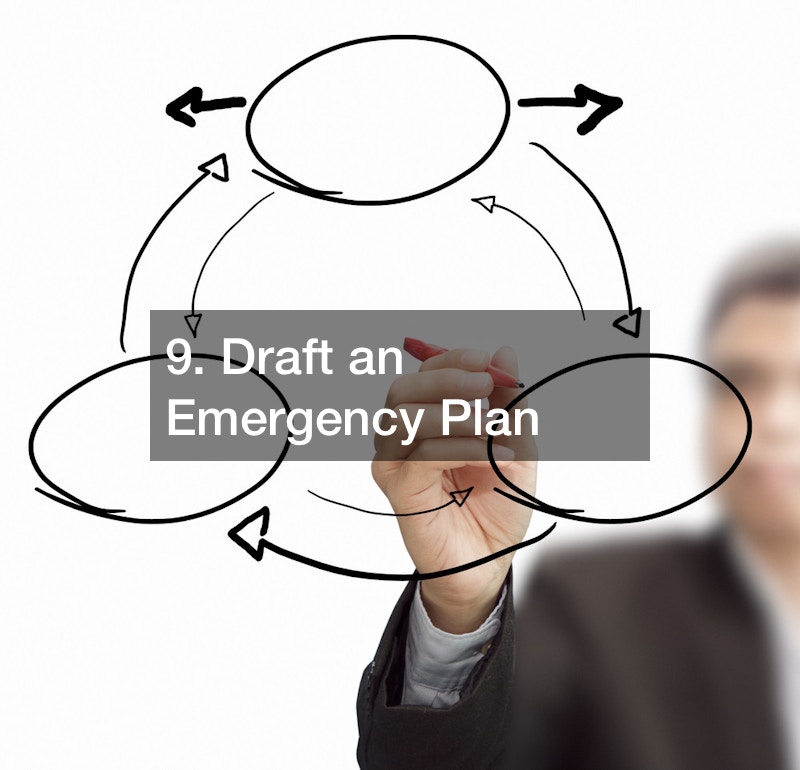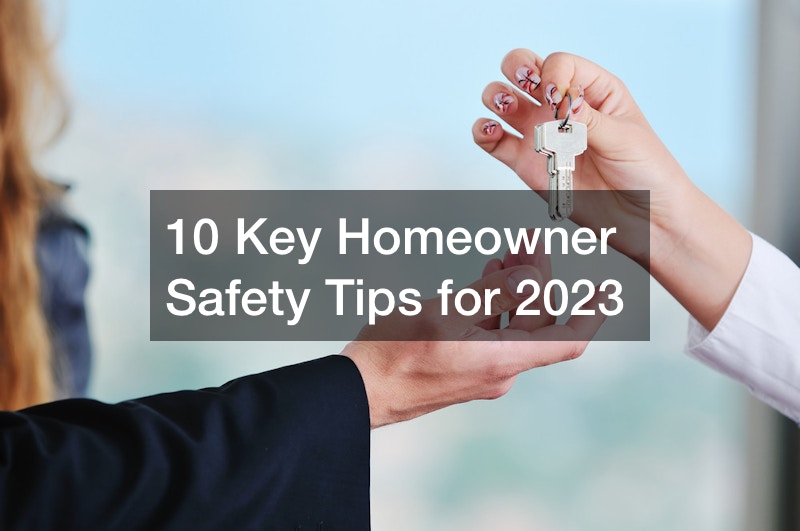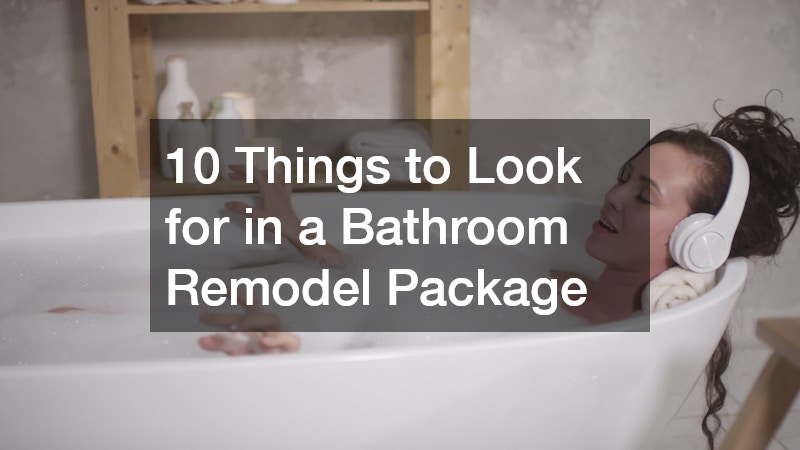10 Key Homeowner Safety Tips for 2023
Home should be the safest place you and your family can be. Yet sometimes, at home, we’re injured, our property is damaged, and burglars break into our homes. Consider these safety statistics:
- In 2021 alone, 52.5 million people sought medical help for non-fatal injuries caused at home or a community venue, per the National Safety Council.
- According to NSC, 58% of home-related injuries are because of poisoning
- In 2020 alone, 56% of reported burglary cases happened on residential properties per Crime in the United States Annual Reports, FBI Data Explorer
Of course, law enforcement and other legal institutions work 24/7 to ensure security for all. However, many home safety issues are preventable with the right homeowner safety tips. Here are ten homeowner safety tips you can apply to your home to improve safety.
1. Secure Main Entry Points
In more than 50% of all burglaries, the burglar enters through unlocked windows and doors, according to the U.S. Department of Justice. If the door is locked, the intruder may attempt to damage the door or window to gain entry. As a measure of the last result, the thief may use brute force to gain entry.
One of the most obvious homeowner safety tips you can apply is securing the home and door. Of course, the best place to start is to lock your windows and doors, especially if you’re working inside the house or leaving for vacation. A modern solution is smart locks integrated with an alarm system.
The next stop is reinforcing your windows and doors to make them indestructible. You could engage the services of a window and door installation company because they have access to burglar-proof products and can do professional installations. A good strategy they might use is installing deadbolts and regular maintenance, such as inspecting door frames for wear and tear.

2. Install a Home Security System
Another effective strategy to improve home security is installing a home security system. Yet you may ask: Are home security systems effective? The short answer is yes. Home security systems are effective for detecting, preventing, and deterring crime. Research agrees: One study by the UNC Department of Criminal Justice found that 60% of would-be burglars are deterred from intruding into a home because of home security systems.
A home security system will not prevent break-ins 100% of the time, but your home will be more secure. Home security systems have also advanced recently, and their offerings are more and more effective. You can also choose a home security system that meets your needs and preferences.
When shopping for a home security system, consider your needs vis-a-vis a company’s offerings. For example, do you want to install a security system that covers common entry points? If so, does the company’s system have sensors and trip alarms? Is it possible to integrate the system for all your home so you can monitor from your phone?
3. Fireproof Your Kitchen
Safety is not always about thieves and intruders. Sometimes your kitchen can be a safety risk. Research agrees: According to the National Fire Protection Association, there are about 175,000 fires yearly in the U.S. Most of these are caused by cooking. The last thing anyone wants is a preventable fire to cause pain to you or your loved one.
Safe cooking practices are among the easiest homeowner safety tips. Keep attentive when cooking, and don’t leave cooking meals unattended. Wear fitting cooking clothes and keep clothes away from the fire. Also, ensure all your appliances are well-maintained and don’t have loose wires. Lock away cleaning supplies and any flammable materials.
You should also go further and fireproof your kitchen building. You can begin by installing high-quality smoke detectors and having a fire extinguisher nearby. It may also be recommendable to have a locksmith company install fire door locks in case of a fire emergency.

4. Light Up Your Home
Back to intruders and house breakers. Light up your home. Burglars dislike that. They prefer shadows and darkness. Like with home security cameras, lighting your home, especially the exterior, is a strong deterrent to would-be burglars that your home is occupied. Illuminating your home will send a strong message to intruders that the house is being monitored, and law enforcement officers will be much easier to call.
You can invest in home security lighting that covers your home in totality. Of course, lighting up your whole home for an extended time can become costly, so you must be creative. For example, choose the most vulnerable areas, such as common entry points, and use LED lights or solar energy.
Lighting up your home is also one of the best homeowner safety tips because you can integrate security lights with other security elements to make it more secure. For example, you can integrate it with your home security, so the lights go on when the alarm is triggered. You also integrate it with neighbors in a watch program, creating an atmosphere of occupancy and control.
5. Know Your Emergency Contacts
Home safety issues range from security issues such as invasion to health risks such as poisoning. That’s why you should know your emergency contacts for each issue. Your emergency contacts will differ depending on where you live and your house occupants. Here are some of the emergency contacts you should have.
- Emergency Call Centers: It is the first contact you should have for emergencies, which is 911. It’ll connect you to the police, emergency medical services, and the fire department.
- Your Doctor: While 911 connects you to emergency medical services, you may get faster help from your doctor because they understand your health better.
- Poison Control Center: Most preventable injuries happen in homes because of poisoning. You can reach the U.S. Poisons Control Center at 1-800-222-1222.
- Vetinary Officer: The emergency may not be necessarily animal-related. It would be best to have a local veterinary officer’s contact if your pet has a medical emergency.
- Local Utility Companies: HVAC emergency repair technicians, electricians, security doors technicians, and plumbers.
- Your Neighbor: Sometimes, your neighbor may be the best emergency contact, especially if you’re not around your home during an emergency

6. Install Security and Video Cameras
One of the key homeowner safety tips you can consider is installing security cameras on your property. Some security systems also come with a camera, which can be part of the package. Just like security lighting, security cameras deter intruders from invading your home. You can do small security camera installs in strategic places.
With integration with smart devices, you can easily monitor your house even when you are on vacation. You can inform local law enforcement or your security camera before an intruder can do any harm. Some people may feel more secure and safe knowing what’s happening at home.
In case of an invasion, you can use your camera and video feed to report the case to law enforcement. When shopping for a security camera, check for capabilities for integration because it makes the whole home security system even more effective. Of course, you should consider pricing to stay within budget.
7. Protect Your Data
One of the homeowner safety tips you should pay attention to is data protection. Yet cybercrime is some of the costliest crimes that happen in homes. They’re also the most underreported. One Pew Research Center study found that 60% of respondents had a personal data breach experience. At the same time, the research doesn’t say if the breach happened while at home; many security loopholes could have made this possible.
How can such breaches happen at home? One of the ways this can happen is through unsecured home networks, where hackers can gain access to personal information. Another popular tactic for cybercriminals is posing as a trusted source, for example, a home network expert, to gain access to your information. One step to protect your home from data breaches is to use strong passwords in your home networks, accounts, and devices. You can also engage trustworthy IT security services to keep your software up-to-date and recommend safety measures to protect your home.
8. Keep Potentially Hazardous Materials Safely
As mentioned, most home-related injuries and deaths are because of poisoning. Therefore, you have a significant role in minimizing the chances of poisoning in your home. It’s possible to prevent intentional and unintentional poisoning by removing all hazardous materials from easy access.
Children are the most vulnerable to unintentional poisoning because they experiment. You may already have removed obvious hazardous substances such as garden pesticides and paint thinners, but other seemingly innocent products such as cosmetics and cleaning products could poison your child. In fact, according to the National Capital Poison Center, the two types of products are implicated in 23.2% of all pediatric poisoning.
You can minimize poisoning risks by locking away hazardous materials in a dedicated space. A locksmith services provider may help with installing impenetrable locks in this space. Another strategy is educating your family on poisonous materials and why they should not touch them.

9. Draft an Emergency Plan
Even with the best security plans and homeowner safety tips, sometimes the worst happens. You have little control in emergencies, such as floods and natural fires. Yet you could take control back by having an emergency plan. Gate installation services can help you by installing remote access or flood and fire-resistant gates.
Here are the steps to draft an emergency plan.
- Identify potential emergency causes, such as fires and floods
- Know your resources. For example, does the government have an emergency contact for events such as floods?
- Draft a communication plan, for example, what to do if phone lines are not working
- Identify Escape routes. Have a drill where everyone tries to get out as safely as possible
- Assemble an emergency kit with supplies such as a first aid kit, food, and clothes
- Consider your family’s specific needs. Do you have a pet, a senior adult? Does anyone have special medical needs?
- Review your emergency plan with family once in a while and update it accordingly
10. Get to Know Your Neighbors
Sometimes, trusted neighbors’ eyes are more helpful than a home security camera system. That’s why one of the best homeowner safety tips is knowing your neighbors. Sometimes, they’re the first to notice something is amiss at home. They may notice someone loitering outside your home, a fire, or your kids talking to a stranger. If you never speak to them, they may not have enough incentive to inform you.
If you’re new to a neighborhood, introduce yourself with friendly greetings. In most neighborhoods, there are events such as weekend barbecues and clean-ups. They may even have a neighborhood watch program. If there’s none, you could start one. Neighborhood watch programs promote security by coordinating security efforts, such as coordinated security lighting.
Another way to get to know your neighbors is by offering help. If you catch up with them at the grocery shop, offer to help. If they’re watering plants, you can offer a helping hand. If you help your neighbors today, they’ll be more concerned about your welfare and security next time.
Thanks to technological advancements, better approaches by law enforcement, and community vigilance, crime is lower, yet crime is still a problem in homes and commercial places. Keep your home secure by investing in security systems and engaging in safe behavior, such as locking your doors and windows.
Also, since safety goes beyond security, you should protect your home from fires, health safety issues, slips, and falls. Sometimes, safety comes through social behavior, such as befriending your neighbors. With the above ten key homeowner safety tips, you can create a safe and secure place for your family.





